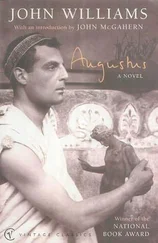His voice is clear, his manner calm.
'These things write we unto you that your joy may be full.
'This then is the message that we have heard of him, and declare unto you, that God is light, and in him is no darkness at all.'
John speaks on in the candlelight until it burns low and another is lit. He speaks without fatigue, telling, urging, teaching what numberless multitude in the unseen world might yet be Christian. He thinks of it as a last act, a summation of what is, a last offering out of his life that those he loves might use in their labours. For he has understood that in Ephesus there is much darkness. 'The whole world lies in wickedness,' he tells Meletios to write. And the writing, the telling, is an act against this. It is both warning and promise. 'Believe in the name of the Son of God,' he tells, 'that ye may know ye have eternal life.'
The dawn comes and he is speaking yet. His throat is grown hoarse, and Meletios looks up from the scripture, fearful that the Apostle will speak himself to his last breath. 'You must rest,' he says, 'we have the Word. We will bring it forth.'
The disciples are rapt, in-spired. How is this the aged one they feared dying after his fall? Danil brings him water to drink. John sips at it. He falls silent; in the after-hush asks, 'Is Papias not returned?'
How long is love? How long is love when there is nothing? When there is no other? When there is none to touch or see or hear? How is love then to endure? What hope for human love when it is sustained only by belief? How can a man love God? How can he love what he cannot see, cannot touch, cannot feel? And, more impossible yet, how can he feel that God loves him back? Does the air love? Does the sun? Does the dust of the plain?
I am not worthy to be loved. My very flesh dies.
If we are loved, why is our way not made easier? Why does evil and pestilence prosper? Why do our enemies thrive? Why does the Lord not help us when we have carried his Word for so long? Where here is love? Where is the love in these blisters, in this disease that eats to my heart? Where is the love in this pain that wracks my body? O my soul is black with anger.
I am not worthy to be loved. My very flesh dies.
But O if you would come.
If you would come, I would be healed.
If I could see you, I could love.
If I could touch you, I could love.
If you would come.
John is the Apostle. I do not believe the scripture. Matthias twists the world for his own vanity. The Apostle rests in the house of Levi. I would I could go to him. I would I could kneel by his bed and his hand lay upon my head.
But I will not see him again now.
He it is who loves. He it is who remains true. Does his love for you not die? Does it remain a lifetime? Though it is yet ages past since he saw you, does he see you still? What can he feel that I cannot?
I feel only grief.
I confess it. I feel only grief and loneliness and anger.
By my sins I am cast out. I am elect to death.
Where is the love for me? Where is the mercy?
I crave it. I crave to feel love.
O my heart bleeds. My soul is black with anger.
Lord, have pity.
In a quake-toppled house where remains a room partly roofed, Kester the thief attends to Papias. The disciple is lain in a corner on a wooden pallet with a coarse covering of camel hair. His arms he crosses to scratch at his sores. Shakes wrack him. Now he trembles violent as a leaf in the last gale of autumn, now he is still as death. Such sudden visits make his body weaker still. If he would sleep, he might have respite, but he cannot. He lies with eyes baleful opened. All day and all night he stares. The vacant air lit and darkened, he studies as if for transport of angels. But none such come, only further sores. These, as though his blood resists less or extends welcome, bloom swiftly. There are sores built on sores. Rough ridges of flesh rise and burst in yellow pus. His nails flail. His lips swell as though by sinister kiss. Blisters at the edges will bleed if Papias opens wide his mouth, so Kester dribbles water from a cloth. He sits by. Sometimes in the day he is gone into Ephesus and returns with what he has stolen — foodstuffs, cloth, the makings of fire.
From a stall in a market, whether by theft or bargain, he brings herbs for a cure. These he mixes to a brew, lets cool till thickened to a paste.
'Why? Why do you bring this? I am to die, go away. Do not touch me. Save yourself, leave me,' Papias says, and turns from him to the wall.
Upon the raw exposed back, Kester lays the paste.
But the cure does not take. The sores climb the disciple's throat to meet those that travel out from the lips. On the bed, Papias shakes like the toy of a distempered child. He cannot still himself. His hands tremble wildly; his arms fly about; he lets out a long, pitiful moaning; tears at his hair. The pain become unendurable; he crawls to chafe himself against the wall, blood and poison running, as he cries out, 'Take me! O Lord, I beseech you. Hear me!'
The disciples are heartened. Within a day they have learned the epistle by heart; through them it will multiply. They preach with emboldened spirit by the basilicas, in market squares. Tireless, they go all the streets of the city fishing for souls. There is concern for Papias but not yet alarm.
The young man with eyes of piercing blue who is called Polycarp is brought to meet the Apostle and becomes one of them. On good reports of the faith of Gaius, John dictates to him an epistle, gives it to Lemuel to bring.
'Is there no report of Papias?'
'We seek for him everywhere, but he is not known.'
'Seek still. I will pray for him.'
The Apostle angles his face upwards, as if to interrogate the sunlight. In the stillness of the day his strength ebbs. Having so long forgotten his body, having lived without thought of its health for many years, now he finds he is reminded of frailty. This stiff movement of his fingers, this seized joint of elbow, labour of lungs, grind of anklebone, intervals of deafness, heart-race, numbness, cold unfeeling toes, such things as recall him to his humanity. His body fails. Having long since considered time immaterial, he does not know what age he is, and this is of no concern. Only that he abides matters. He must remain until the Lord comes again. That is all.
He lies on the daybed and prays for Papias. He fears the disciple is gone to Matthias or that Matthias has enacted some evil, and he sends his prayers against this.
In the days that follow, the disciples return from the city to report their number grows. In their voices John can hear the timbre of hope.
'There are others who would come see you,' Lemuel tells. 'They ask that they might see the one who touched the hand of our Lord.'
The apostle John hesitates. He does not want to be the reason for belief. He does not wish reverence or awe for his own person.
'Blessed are they who believe without seeing,' Danil says.
'Agreed, but all men are weak. And if it should increase the faith of some, then where is the wrong?' asks Lemuel.
'They have the Word, what need the person?' Danil replies quickly, then seeing Lemuel's eyes realises what he has said. 'I am sorry, Master. I did not mean. .'
'It is the truth, good Danil,'John says, and seems to think on this some time, then decides, 'But if there are some who would come and pray with us and share the Eucharist, then all are welcome. Tell them to come in the truth of our Lord Jesus Christ.'
The evening following, there are twenty. A week later, and from other small communities further distance, there comes more. They are too many to fit into the room and some stand bowed in the street outside. The Apostle is moved. To this church of two score and ten he speaks the words of the epistle. They are a small sect only, a minor assembly among the many others that gather in the city of Ephesus, where heresies flourish, but in their attentiveness and devotion is significance; in their number, too.
Читать дальше










